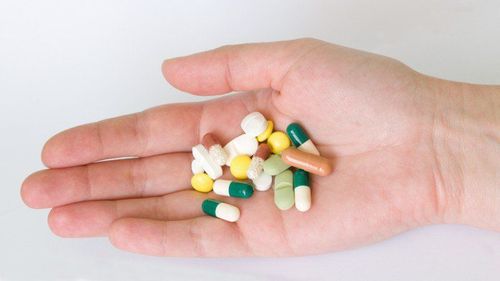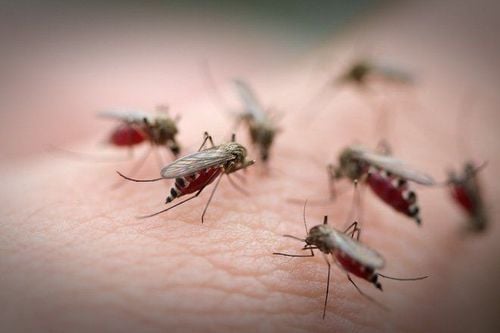Dengue fever in adults is caused by the Dengue virus, the Aedes mosquito is the main vector of the disease. Most people with dengue fever can be treated as outpatients, but if symptoms such as restlessness, lethargy, confusion, abdominal pain, or increased pain in the liver area, etc. appear, they need to be hospitalized for timely treatment.
1. Is dengue fever dangerous?
Dengue fever is an infectious disease caused by the Dengue virus. The Aedes mosquito is the main agent of transmission through mosquito bites. The disease occurs year-round but breaks out into epidemics during the rainy season. The disease occurs in all ages.
Fever is the first sign of the disease. Then, from 4 to 7 days, symptoms such as high fever, headache, nausea, muscle aches, rash, etc. appear. The disease progresses quickly; if not treated promptly, it can lead to dangerous complications such as:
- Damage to blood vessels leads to nosebleeds, accompanied by plasma escaping from the blood vessels and flowing out, leading to patient death.
- Heart failure, kidney failure: The cause is due to continuous bleeding that disrupts the circulatory system.
- Thrombocytopenia: The recognizable signs are fatigue and lethargy.
- Pleural effusion: This is a dangerous complication that can cause death in the patient.
2. Signs of dengue fever in adults
Depending on the stage and severity of dengue fever, the symptoms of the disease are different. Specifically as follows:
Symptoms of mild dengue fever:
- The patient has a sudden high fever of 39 - 40 degrees Celsius, difficult to reduce fever, and lasts 4 - 7 days.
- Severe headache (forehead, behind the eyeballs)
- Joint and muscle pain with rash
- Nausea and vomiting.
Symptoms of severe dengue fever:
- Abdominal pain, vomiting or possibly nausea, cold limbs, panic
- Signs of bleeding appear: Characterized by petechiae on the skin, nosebleeds, bleeding gums, vomiting blood, internal bleeding leading to black stools.
Dengue shock syndrome:
- This is the most severe form, the symptoms include all the manifestations of the mild form and symptoms of massive bleeding inside and outside the body accompanied by shock.
- This syndrome usually occurs during a subsequent infection, when there is active or passive immunity to a viral antigen.
3. Signs needing hospitalization and methods of treatment
3.1. Signs of hospitalization for dengue fever
Dengue fever can be treated and monitored at home, and symptoms of dengue fever can be cured after 7-10 days. However, the patient must be taken to the hospital quickly when there are the following warning signs:
- The patient shows signs of struggling, lethargy, and unconsciousness
- Abdominal pain, increased pain in the liver area
- The liver is larger than 2cm or liver enzymes increase ≥ 400 U/l
- Vomiting more than 3 times/hour within 6 hours
- Mucosal bleeding
- Urinary incontinence
- High Hct but platelets decrease rapidly ≤ 100,000/mm3
- If the patient's house is far from the hospital, and cannot be hospitalized in time when the disease becomes severe, the family is unable to closely monitor, and there are chronic diseases, hospitalization should be considered.
3.2. Treatment of dengue fever
Treatment of dengue fever with warning signs:
- Infusion: Infusion is needed if there is at least 1 of the following signs: lethargy, vomiting, inability to drink water, abdominal pain, dehydration, high Hct
Infusion time should not exceed 24-48 hours.
Treatment of dengue shock:
- Dengue shock occurs when the patient has more vascular leakage than predicted and is often indicated for intravenous fluid treatment.
- In case of dengue shock with accompanying bleeding, treat shock with electrolyte solution.
Treatment of cerebral dengue fever:
- Elevate the patient's head 30 degrees, give oxygen;
- Prevent convulsions for the patient, treat hypoglycemia, and rebalance electrolyte-base disorders;
- Prevent cerebral edema when the patient has clinical signs of increased intracranial pressure by intubation and mechanical ventilation.
- If fever, use Paracetamol rectal antipyretic.
In the first 3-4 days, if home monitoring is indicated, the patient needs to:
- Lie down for rest, eat easily digestible foods, and drink Oresol solution and fruit juice.
- Oral medicine: What medicine should be taken when having dengue fever? When having a fever due to dengue fever, patients need to reduce the fever with paracetamol; do not use Ibuprofen or Aspirin
- If the patient has serious developments such as lethargy, restlessness, cold limbs, abdominal pain, vomiting frequently, etc. then they need to be taken to a hospital.
4. Preventing dengue fever
Dengue fever is a disease that can cause dangerous complications, so it is necessary to prevent by:
- Keeping the living and surrounding environment clean; clearing bushes; preventing storing water in buckets or other utensils in houses;
- Applying methods to repel mosquitoes, spraying mosquito repellent;
- Putting mosquito nets on when sleeping to avoid mosquito bites;
- If there are signs of fever, seek medical attention and treatment.
Please dial HOTLINE for more information or register for an appointment HERE. Download MyVinmec app to make appointments faster and to manage your bookings easily.













